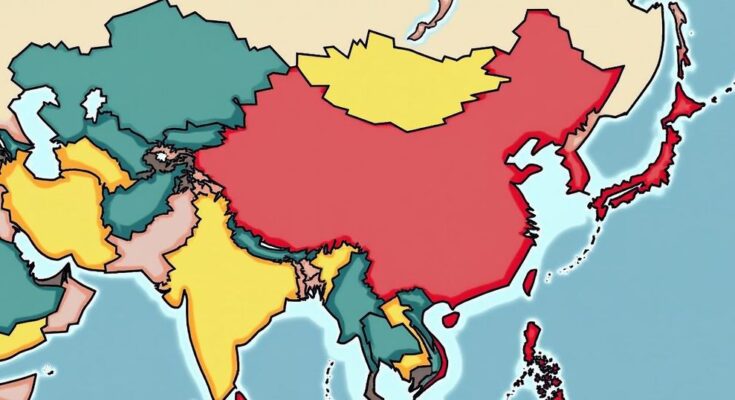The Asian States’ engagement with the ILC’s Draft Articles on Crimes Against Humanity illustrates a notable evolution of support, particularly following a recent resolution from the UN General Assembly. This article explores the perspectives established through AALCO discussions and highlights the imperative for Asian nations to reinforce their collective voice towards cultivating a robust legal framework addressing crimes against humanity.
The position of Asian States towards the International Law Commission’s (ILC) Draft Articles on Crimes Against Humanity is evolving, particularly as discussions at the United Nations General Assembly’s Sixth Committee continue. Since their adoption in 2019, these Draft Articles have faced delays largely due to a lack of consensus on subsequent steps. In a significant advancement, a cross-regional resolution (Res. 77/249) was passed, facilitating resumed sessions in 2023 and 2024 for in-depth discussions on these Articles. The first resumed session in April 2023 allowed for substantial engagement from many States, including those from Asia. As a result, members are now encouraged to submit written comments concerning the Draft Articles by December 1, 2023, ahead of further debates next year. This post examines the records of the Asian-African Legal Consultative Organization (AALCO) to shed light on the perspectives of Asian States towards the Draft Articles and their alignment with discussions held at the UN. Founded in 1956, AALCO has evolved into a vital platform for its 47 Member States and 2 permanent observer States to deliberate and shape legal positions reflective of Asian-African aspirations within international law. AALCO plays a pivotal role in facilitating dialogue on pressing legal topics, including human rights and international humanitarian law. However, despite their historical significance, discussions regarding Crimes Against Humanity have been absent from AALCO’s recent agendas. From 2016 to 2019, various Asian States articulated significant positions on the Draft Articles. Malaysia, for instance, initially branded the ILC’s undertaking as unnecessary due to overlapping obligations under the International Criminal Court (ICC). Similarly, China expressed skepticism about the necessity of a specialized convention, seeking empirical foundations for the Draft Articles. On the contrary, the Republic of Korea affirmed its support for coherence with the Rome Statute, while Japan emphasized the need for balance and caution concerning existing legal obligations. In contrast, Vietnam recognized the importance of an inclusive definition of crimes against humanity, stemming from its historical context. In the years since, support for the Draft Articles is gathering momentum among Asian nations, with several, including Afghanistan, Bangladesh, and Myanmar, backing the proposals. Noteworthy shifts have also occurred, with Malaysia indicating a newfound willingness to support the Draft Articles, alongside Thailand’s expressed commitment to advocate for their adoption. It is imperative that AALCO reinvigorates discussions surrounding the Draft Articles within its work program to formalize a cohesive Asian-African stance. The normative gap addressed by these Articles underscores the importance of state responsibility in preventing and prosecuting crimes against humanity, thereby enhancing inter-state cooperation and domestic legal frameworks. The ongoing discourse at the UN signifies a crucial juncture for Asian States to actively engage in shaping the future of international law surrounding crimes against humanity, perhaps culminating in a substantive treaty that reflects their collective voice.
The Draft Articles on Prevention and Punishment of Crimes Against Humanity, developed by the International Law Commission (ILC), aim to establish a comprehensive framework for preventing and addressing crimes against humanity. Adopted by the ILC in 2019 and forwarded to the United Nations General Assembly, these Draft Articles have encountered protracted deliberations, primarily stymied by a lack of consensus among member states. In 2022, a breakthrough occurred with the adoption of a cross-regional resolution calling for resumed sessions of the UN’s Sixth Committee focused on these Draft Articles, highlighting the growing international need to address such pressing legal concerns. AALCO serves as a critical forum for dialogue among Asian and African states, poised to influence the development and adoption of these Draft Articles.
The engagement of Asian States with the ILC’s Draft Articles on Crimes Against Humanity is essential in progressing towards a comprehensive international framework for accountability. Given the shifting landscape of support from various nations, AALCO’s involvement and advocacy for these Draft Articles could significantly further collective efforts to address and prevent crimes against humanity while enhancing regional legal frameworks. It is paramount for Asian nations to seize this opportunity to be proactive participants in this international dialogue, promoting a cohesive approach that prioritizes justice and accountability.
Original Source: opiniojuris.org




